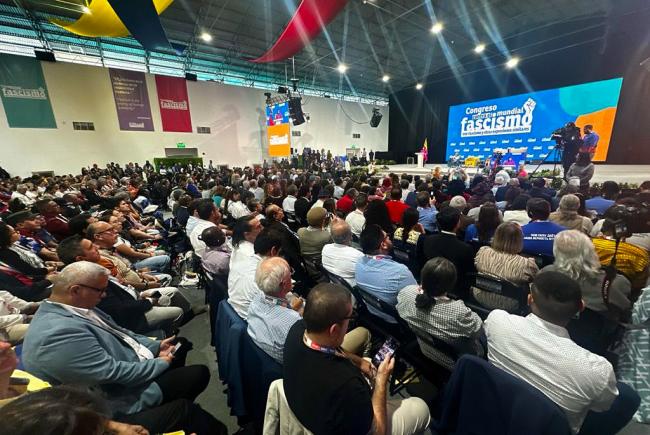Articles Menu

Sept. 16, 2024
In Venezuela, more than a thousand international guests from 95 countries gathered this week at the first World Congress against Fascism, Neo-Fascism and similar expressions. We listened to brilliant interventions that defined the conceptual framework where these political groups are produced and reproduced and emphasized crucial and novel elements of the new era. But the surname 2.0 is not secondary. The new technologies -particularly the so-called social networks- that these political formations have known how to use before and better than others, with the help of algorithms that favor by design polarization, extremism and the exacerbation of feelings of irritability and compulsion to violence in the eagerness to compete for attention, weigh heavily.
The increasingly transatlantic connections have allowed these groups to become one big global family. All far-right politicians have personal relationships. They know each other, often talk to each other, congratulate each other on social networks, meet, participate in meetings organized by their parties and finance their influencers and trolls, who are noticed every time their associates, whether they live in Miami, Caracas or Buenos Aires, are in combat against governments and left-wing parties.
Some mentioned the best known transnational groups, such as the Conservative Political Action Conference, linked to the Republican Party, which has tentacles in Mexico, Australia, Japan, Brazil and Hungary. Atlas Network, coordinated from Washington, DC, provides resources and advice to more than 500 think tanks and partner organizations in over 90 countries – some of the best known include The Cato Institute (USA), Fundación Libertad (Argentina) and Libertad y Desarrollo (Chile).
Vox, in Spain, has launched the Madrid Charter, a programmatic manifesto that formalizes the Iberosphere concept, which has led to the creation of the Madrid Forum. This association, which presents itself as the counterweight to the São Paulo Forum and the Puebla Group, has been organizing meetings in Spain and Latin America; the most recent, last week in Buenos Aires with the star of the Latin American ultra-right, Javier Milei.
The “extreme right 2.0” exists because “colonialism 2.0” has been established globally, sustained by deterritorialized multinationals that receive exorbitant profits through the exploitation of the labor force of the countries of the South. In California, in the warehouses of Amazon and in the headquarters of Apple, Microsoft or any other mega-corporation, Pakistanis, Indians, Africans, Latin Americans, Europeans from poor countries work. For multinationals, whether they are white, black, Asian, heterosexual or homosexual is not a problem. Colonialism 2.0 has shown itself capable of assimilating any religious, gender or racial background, as long as the lithium flows and we continue to be data exporters. What matters in the new colonial reality, even if it is separated by decades or even centuries from known colonial practices, is the extractivist spirit. That is, the willingness to exploit resources in a country to generate wealth that the inhabitants of that territory will not enjoy.
For too long, the left has been lagging behind and watching in dismay as part of the popular classes become irritated when they realize that their policies do not give them the consideration they deserve. They make, yes, magnificent diagnoses. But it is not enough.
Where is the great family of the South to confront at the speed of a click the extreme right 2.0 that mobilizes through the networks and weaves its transnational forums before our eyes? What are the spaces and tools to stop colonialism 2.0, the natural ecosystem of the right?
At the beginning of the last decade, Latin America had regional tools such as the Union of South American Nations and Celac forums that began to answer these questions and to energize the common market of technologies, to dream of a fiber optic cable of Latin American countries to ensure the sovereignty of data traffic, and tried to repatriate the contents of our countries, mostly hosted on U.S. platforms.
It was then realized that no country by itself could dispute the power of the extreme right in the network, nor the transnational platforms, which are the regional and multilateral organizations from where progress could be made in the construction of a digital environment, that is, the possibility of combining knowledge, integrating universities, seeking funding for the development of their own technologies, creating spaces for reflection for the design of common policies.
But this does not exist today, it was recognized in Caracas, when it is urgent to recover these spaces so that the great family of the global South can put a face to fascism, neo-fascism, the extreme right or whatever you want to call these misfortunes that we suffer.
Rosa Miriam Elizalde is the First Vice President of UPEC. Cuban journalist and editor, PhD in Communication Sciences and professor at the University of Havana. She was the Founder and editor of the digital weekly La Jiribilla and the online newspaper Cubadebate.